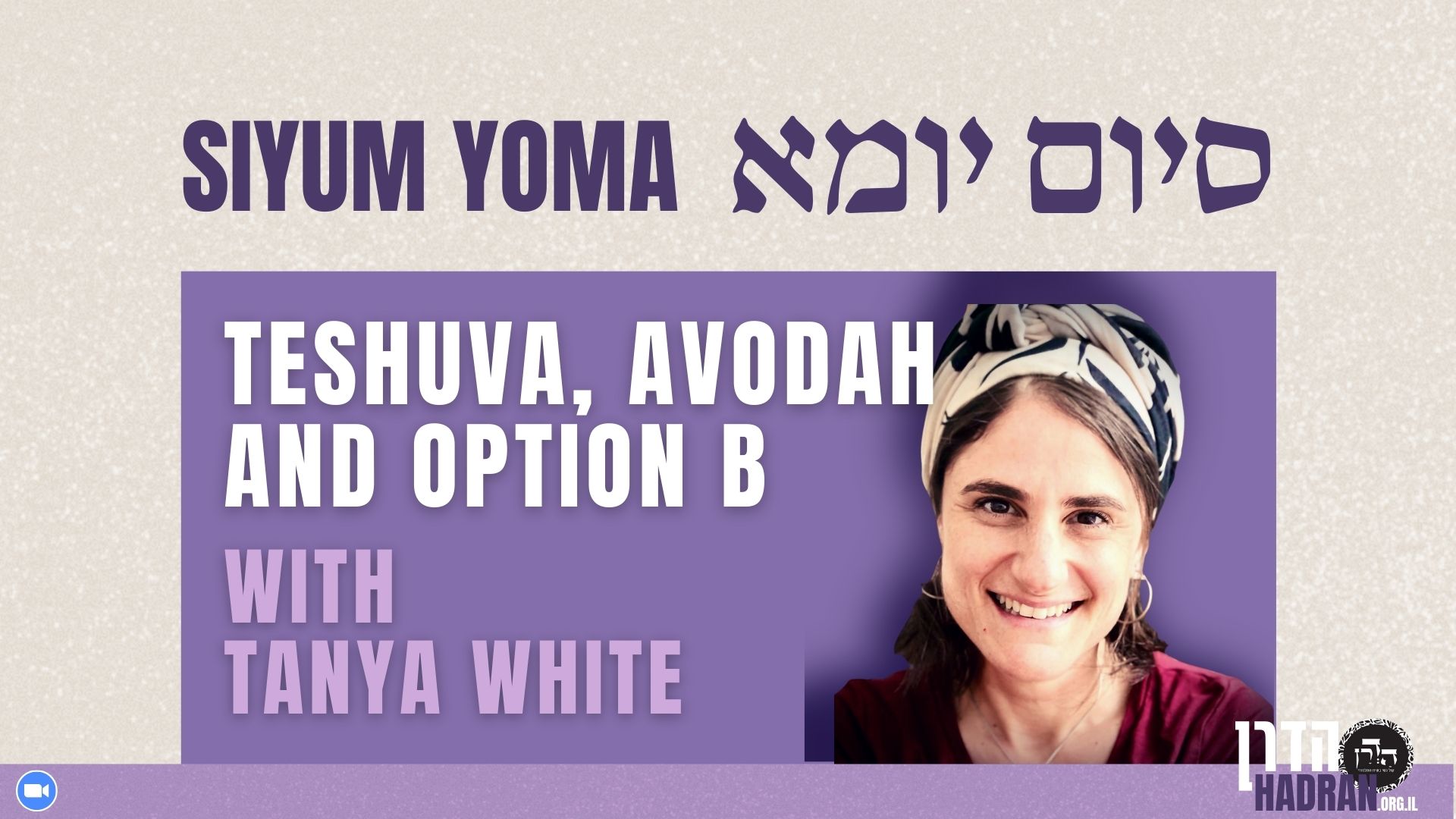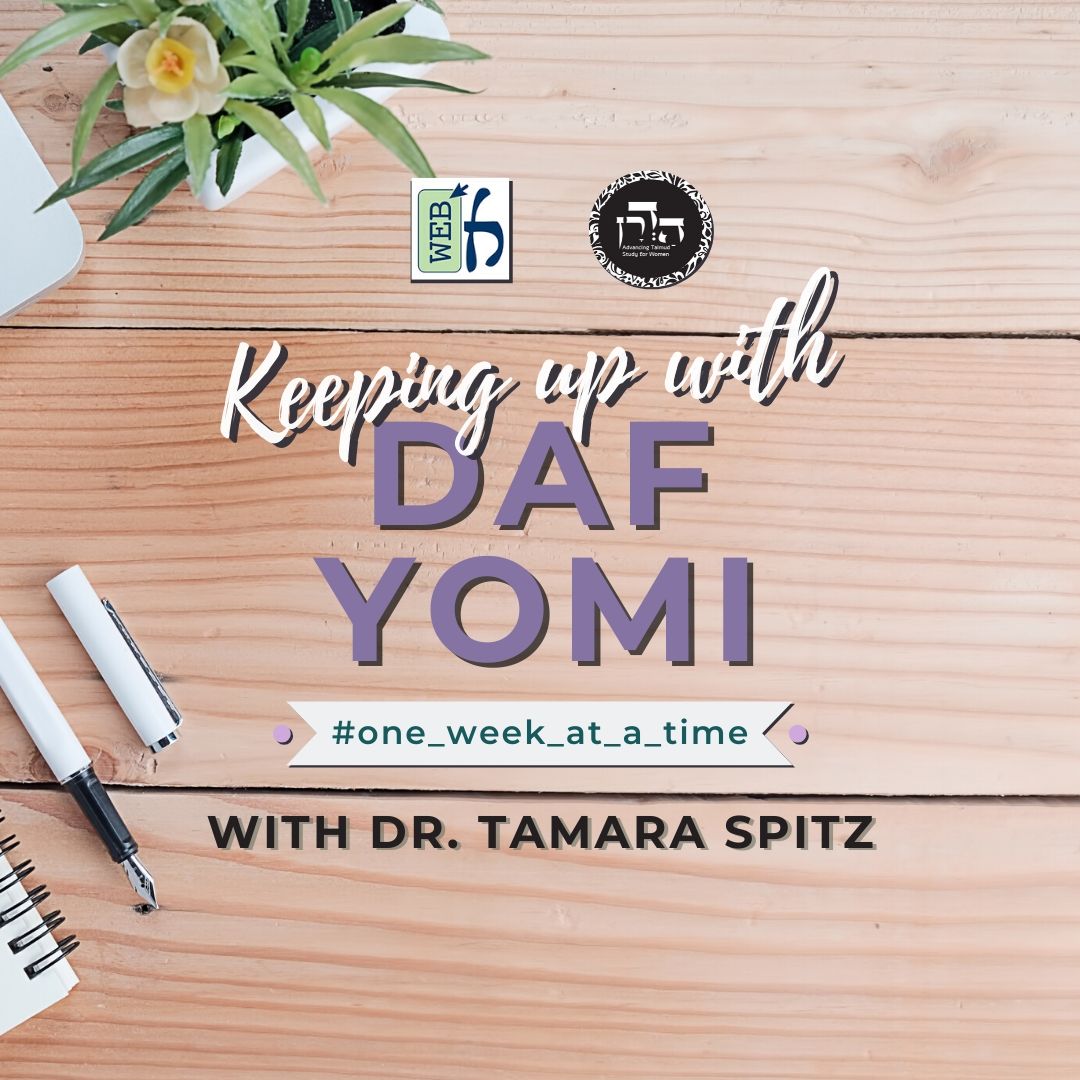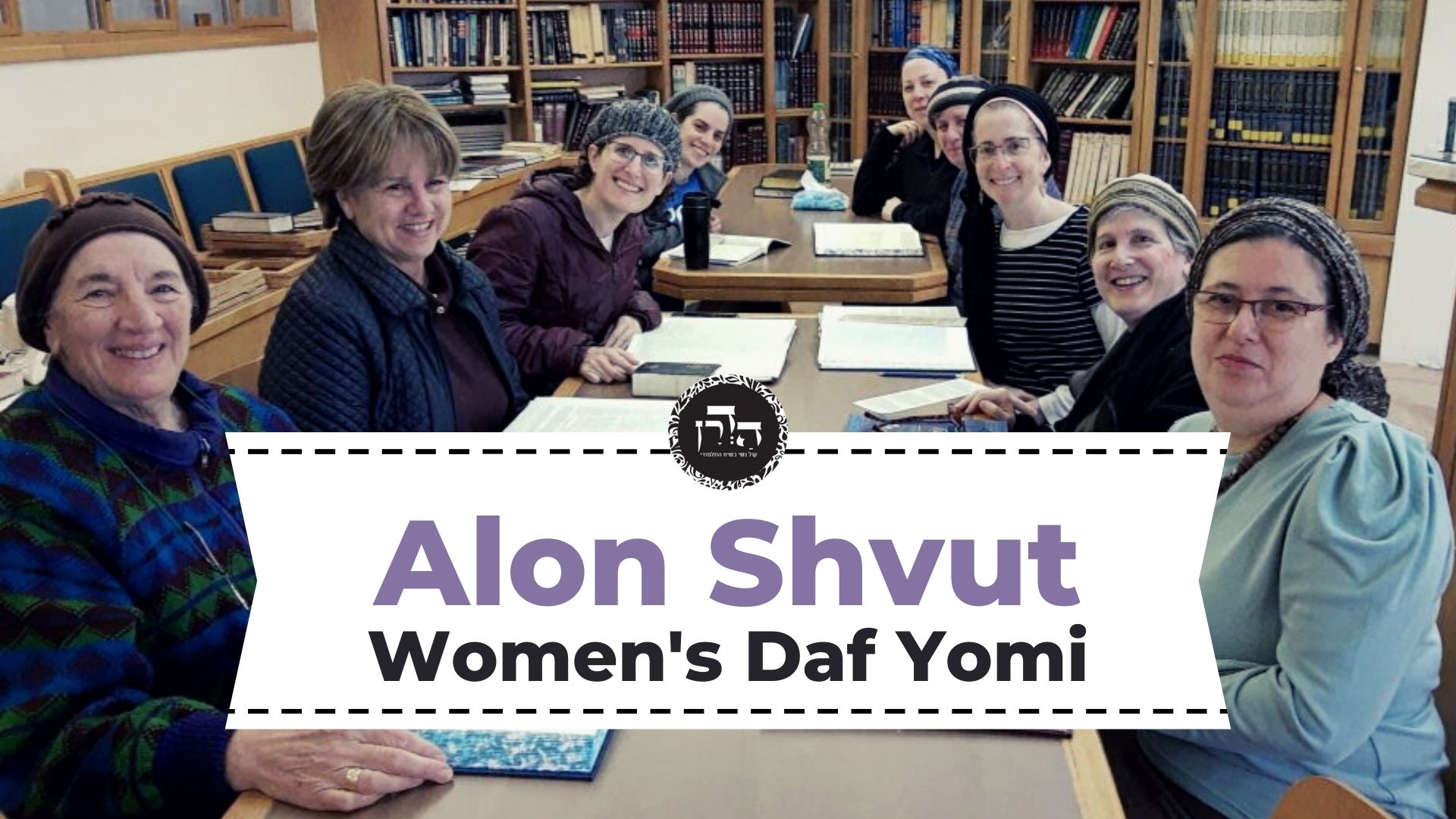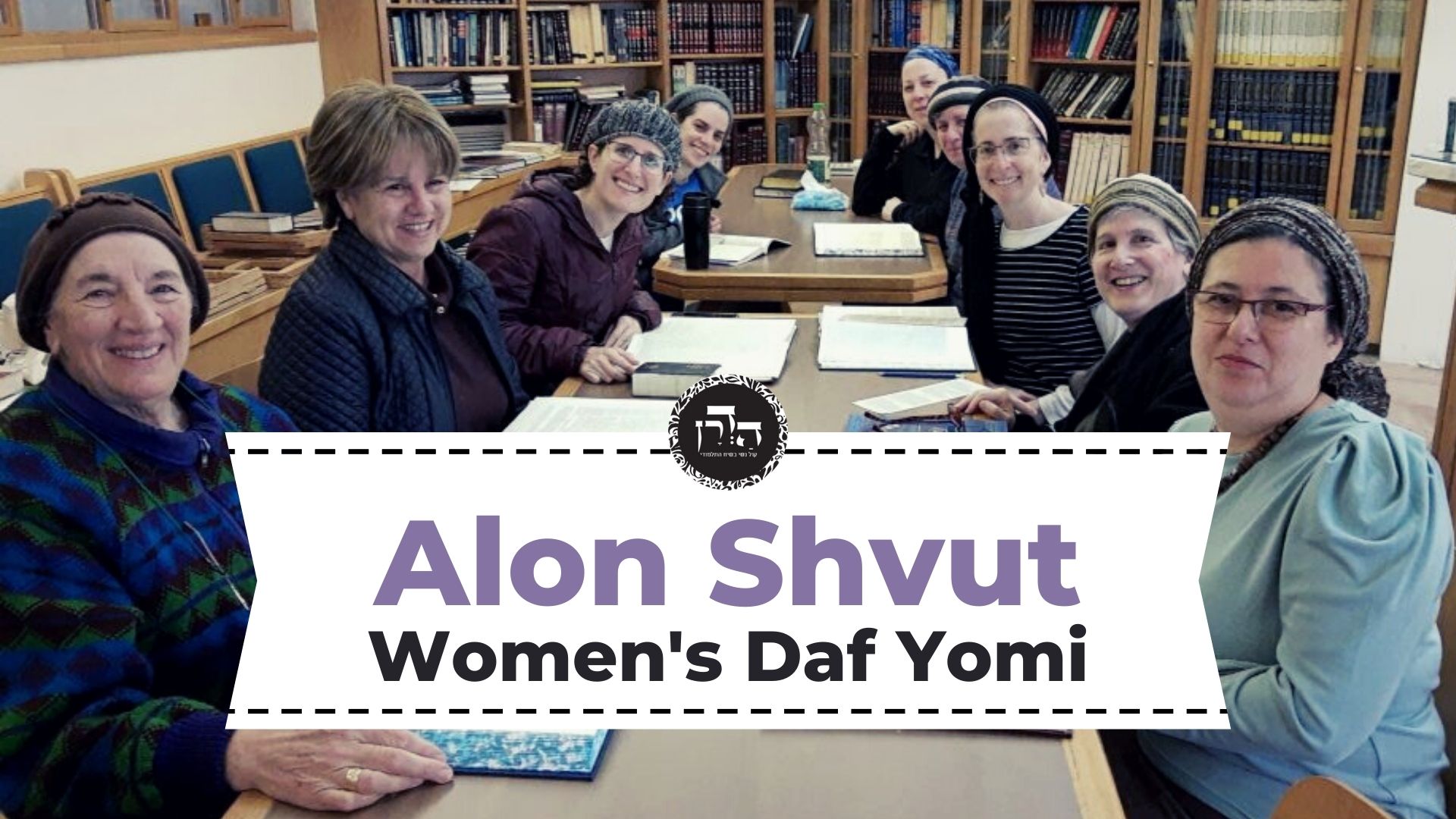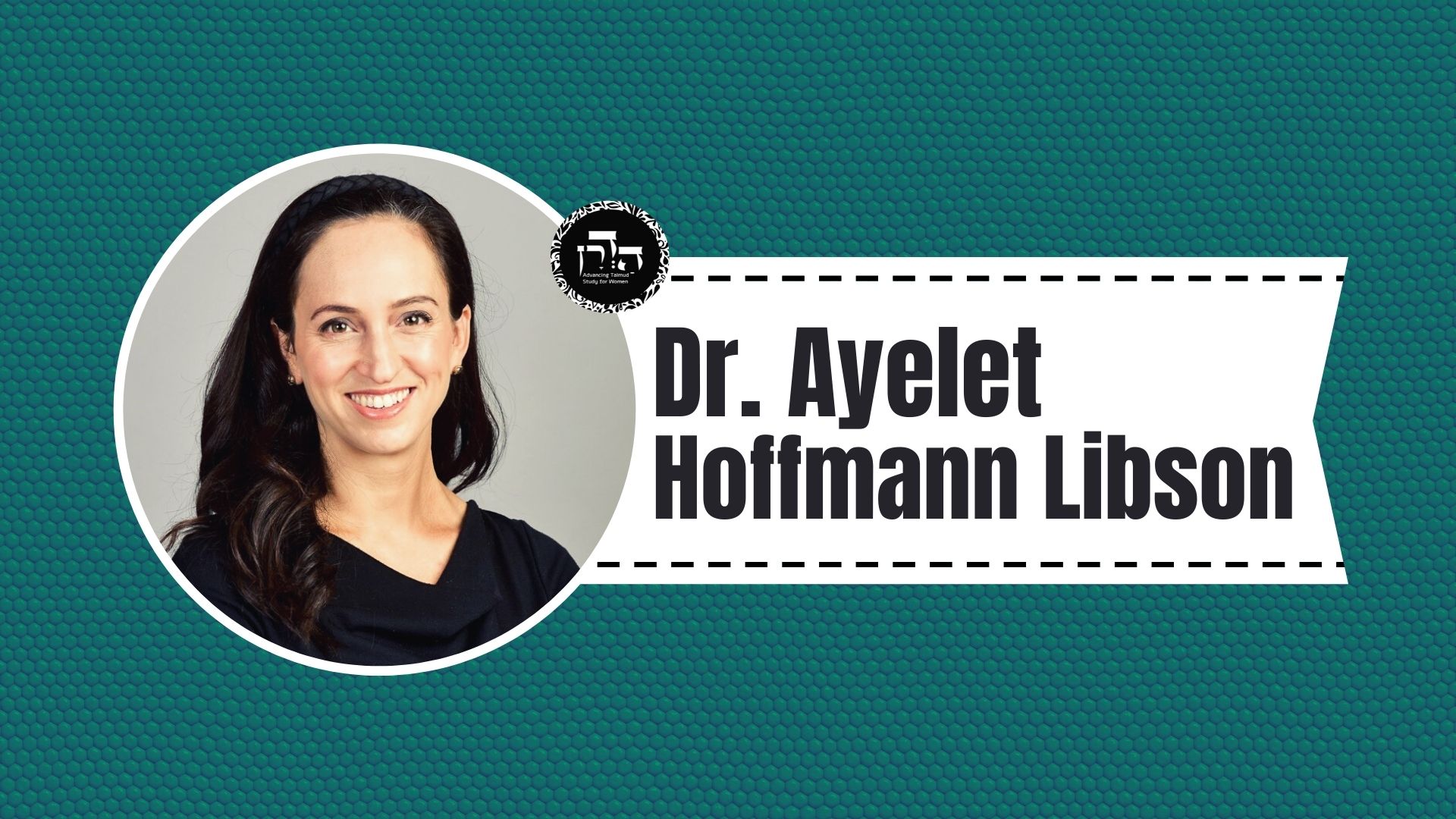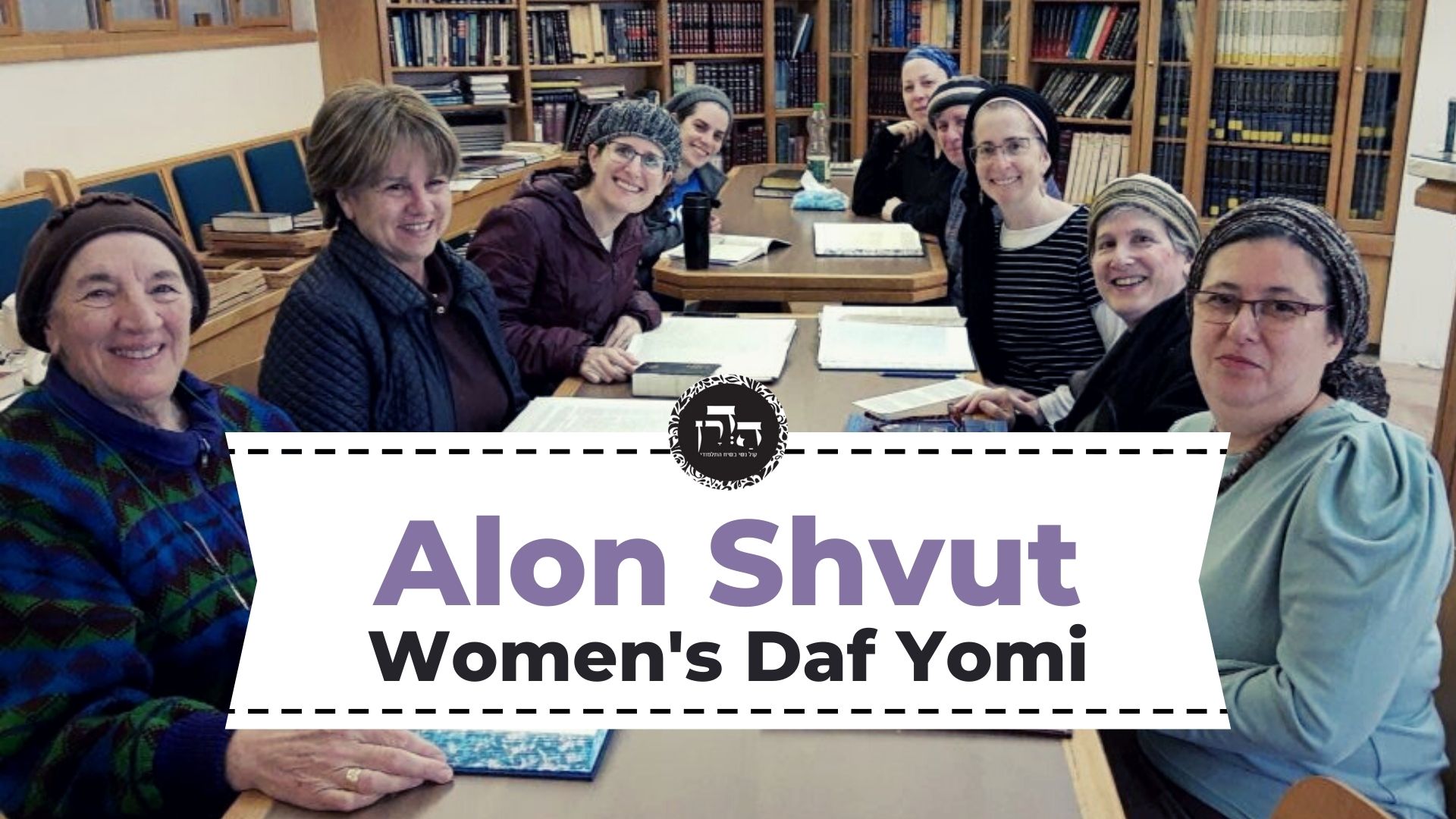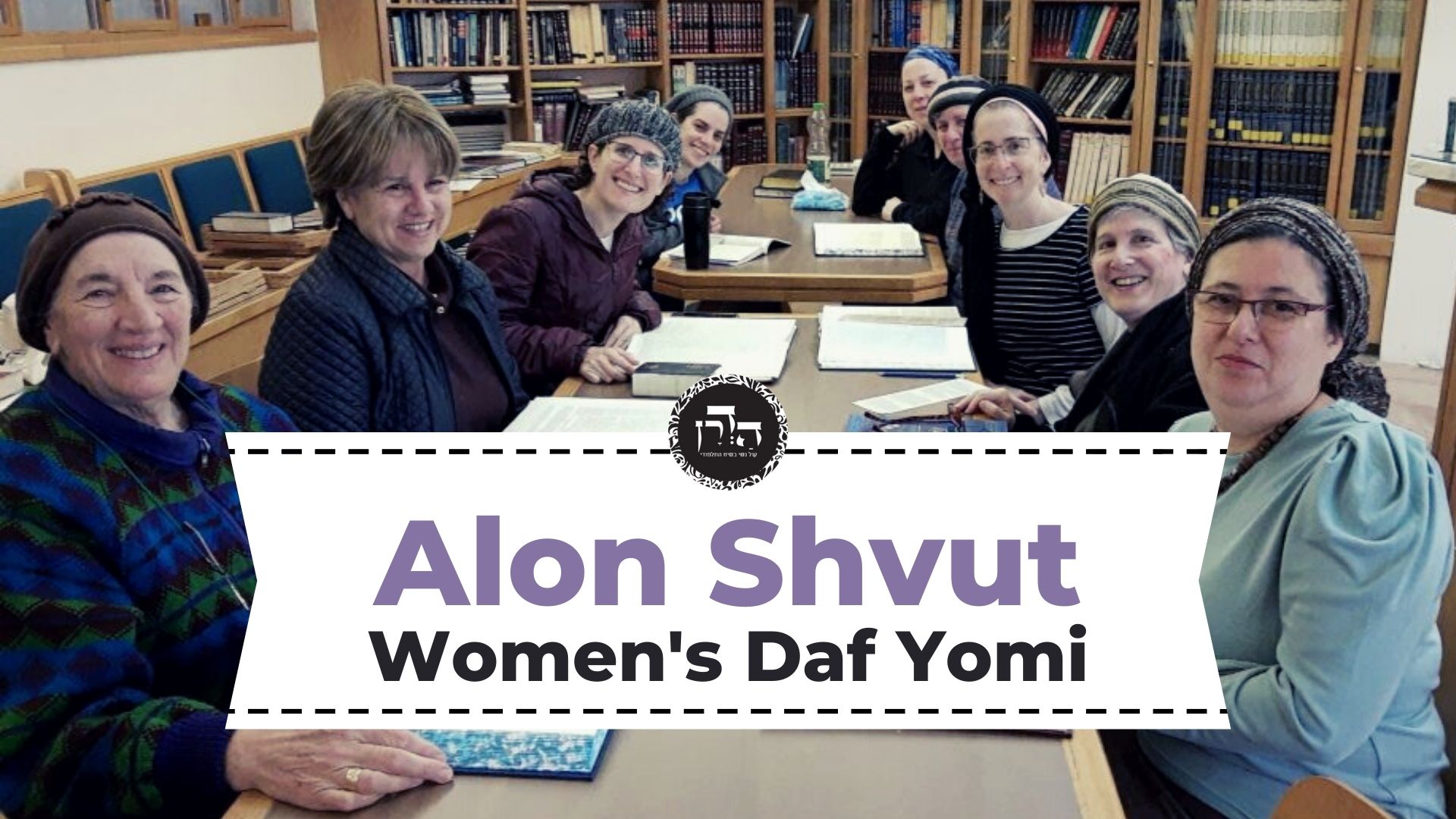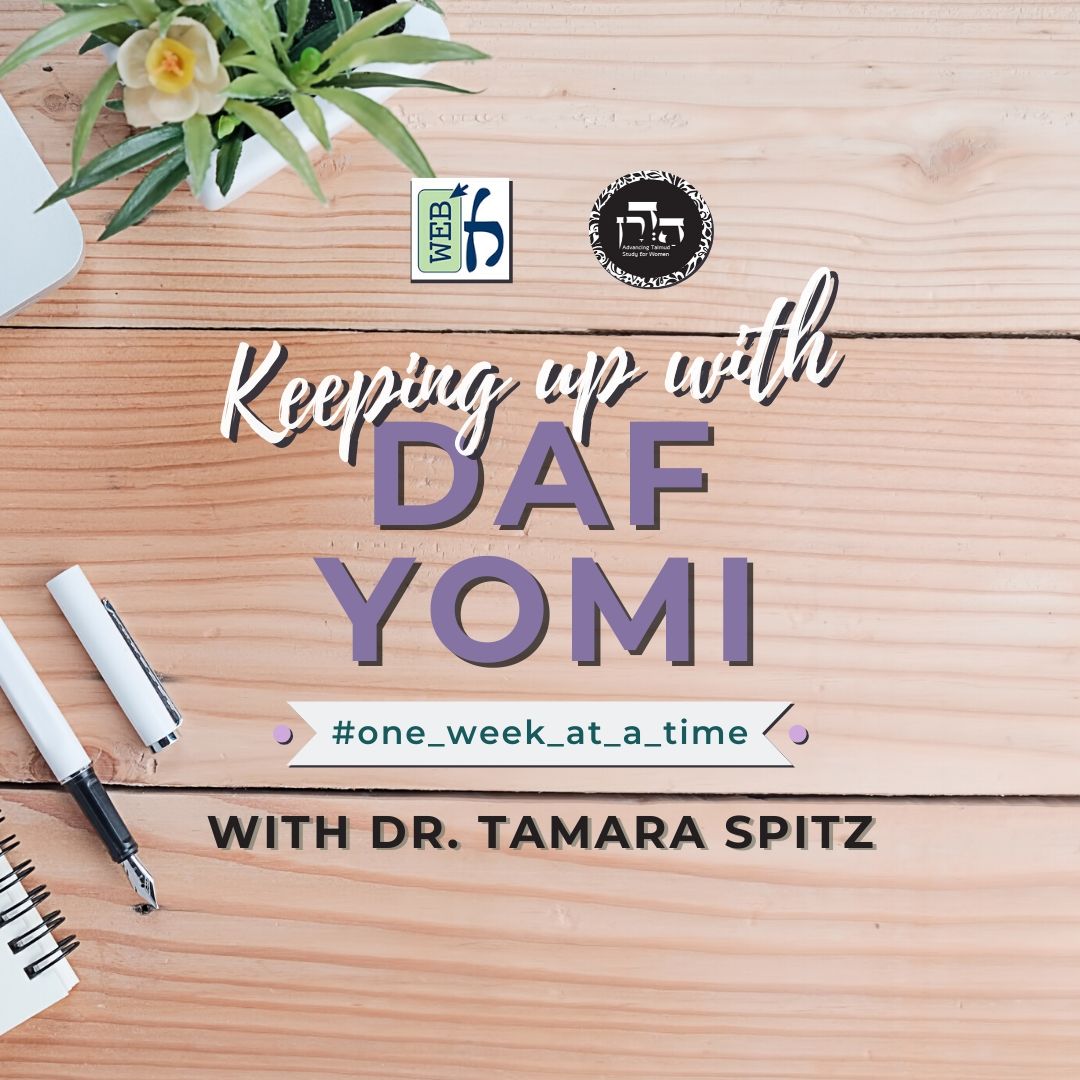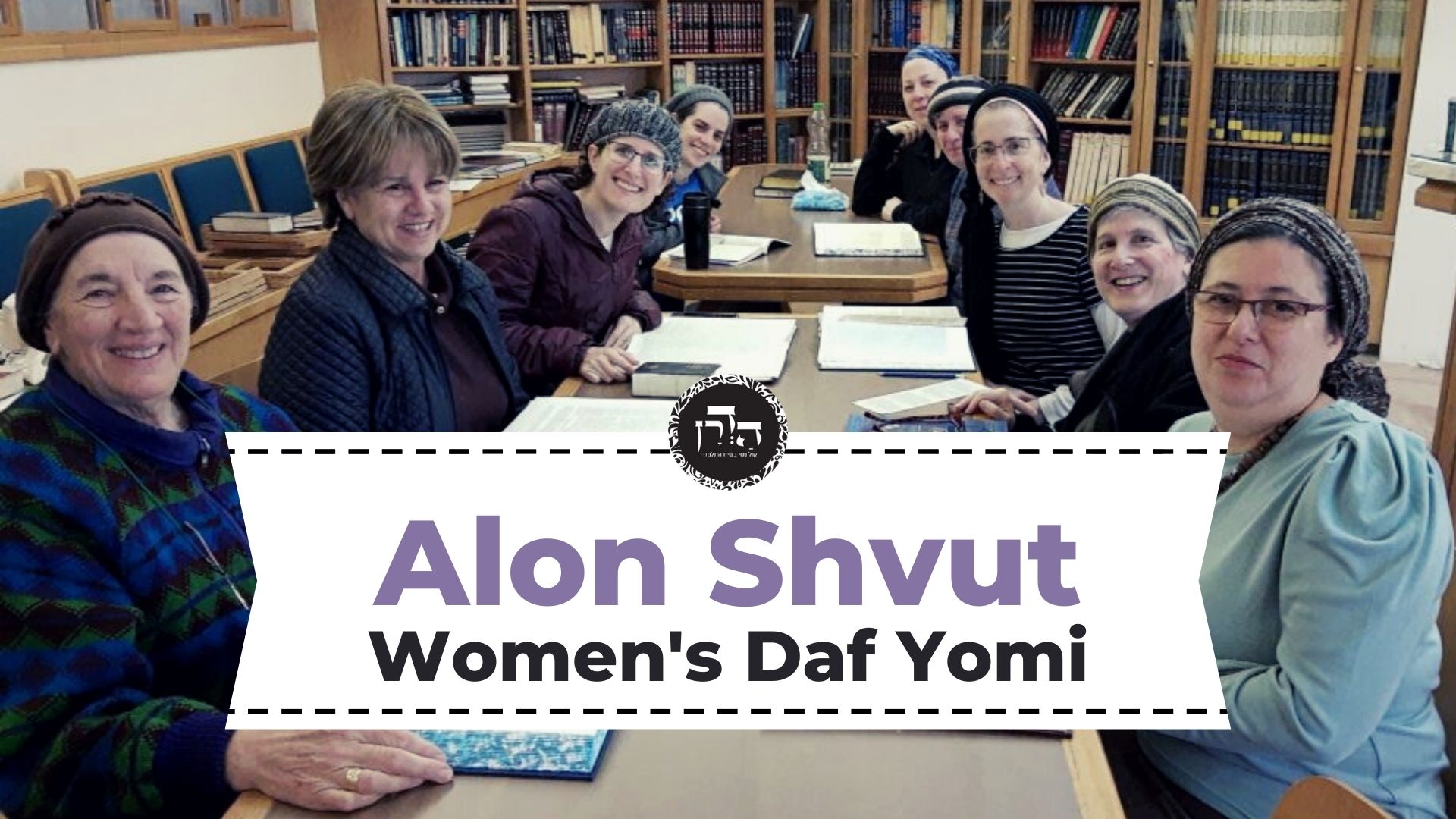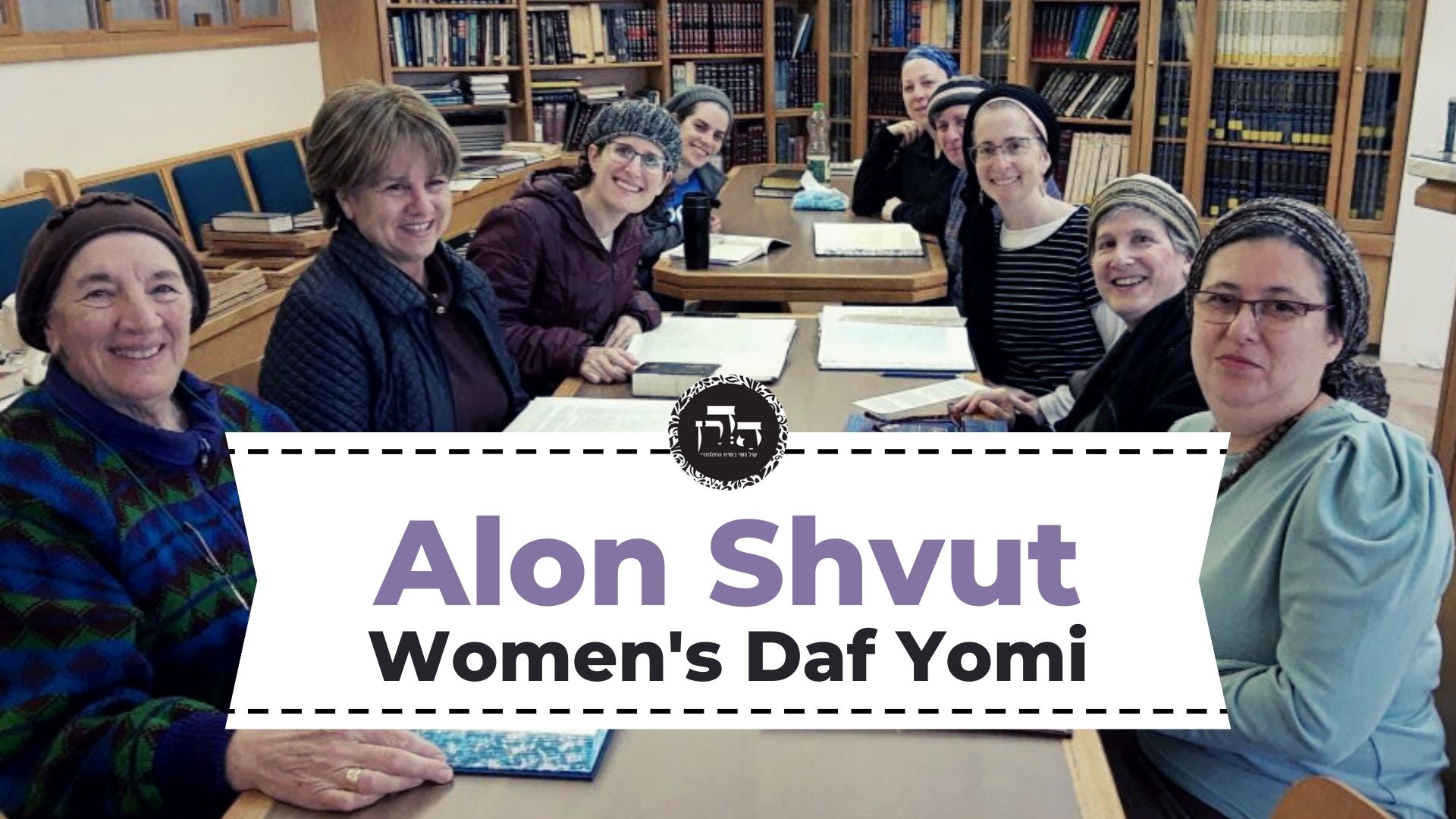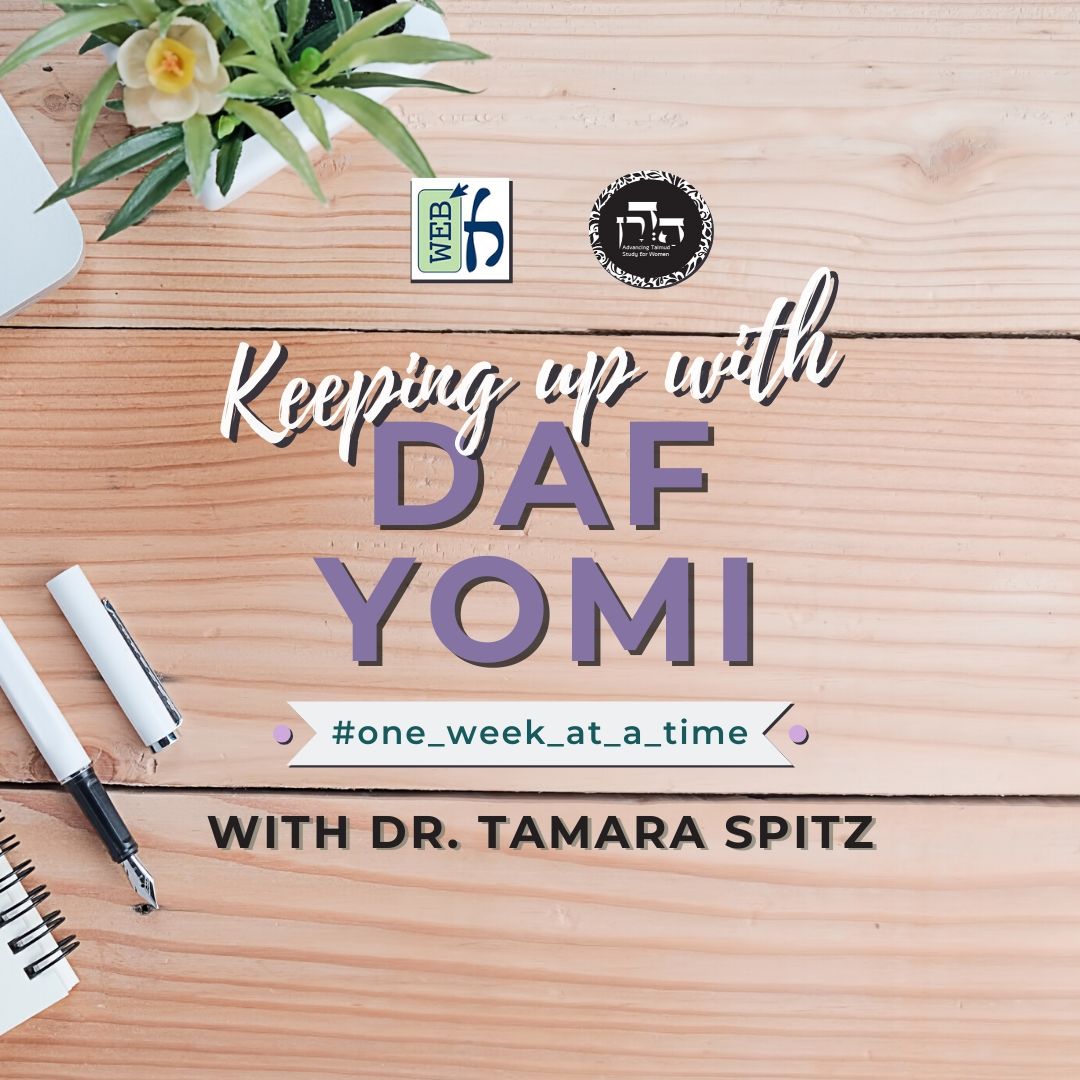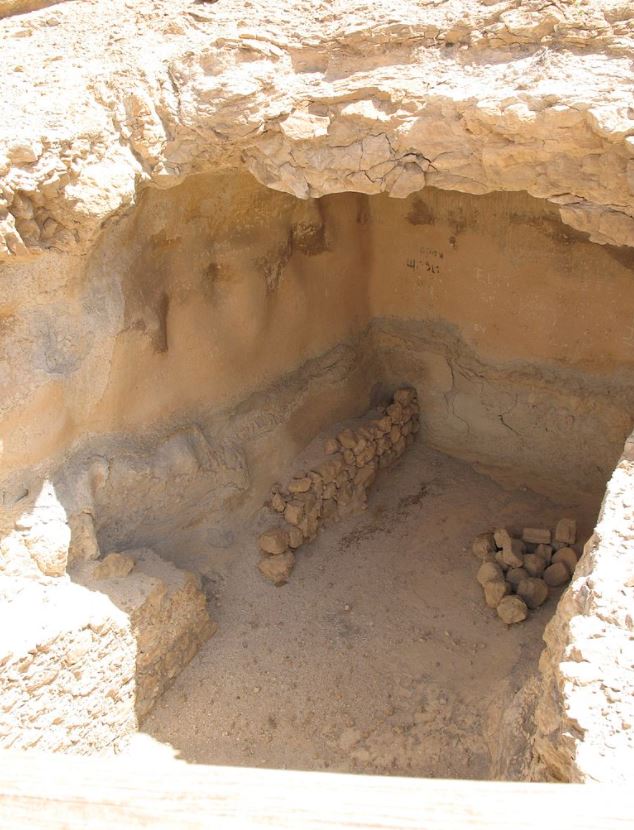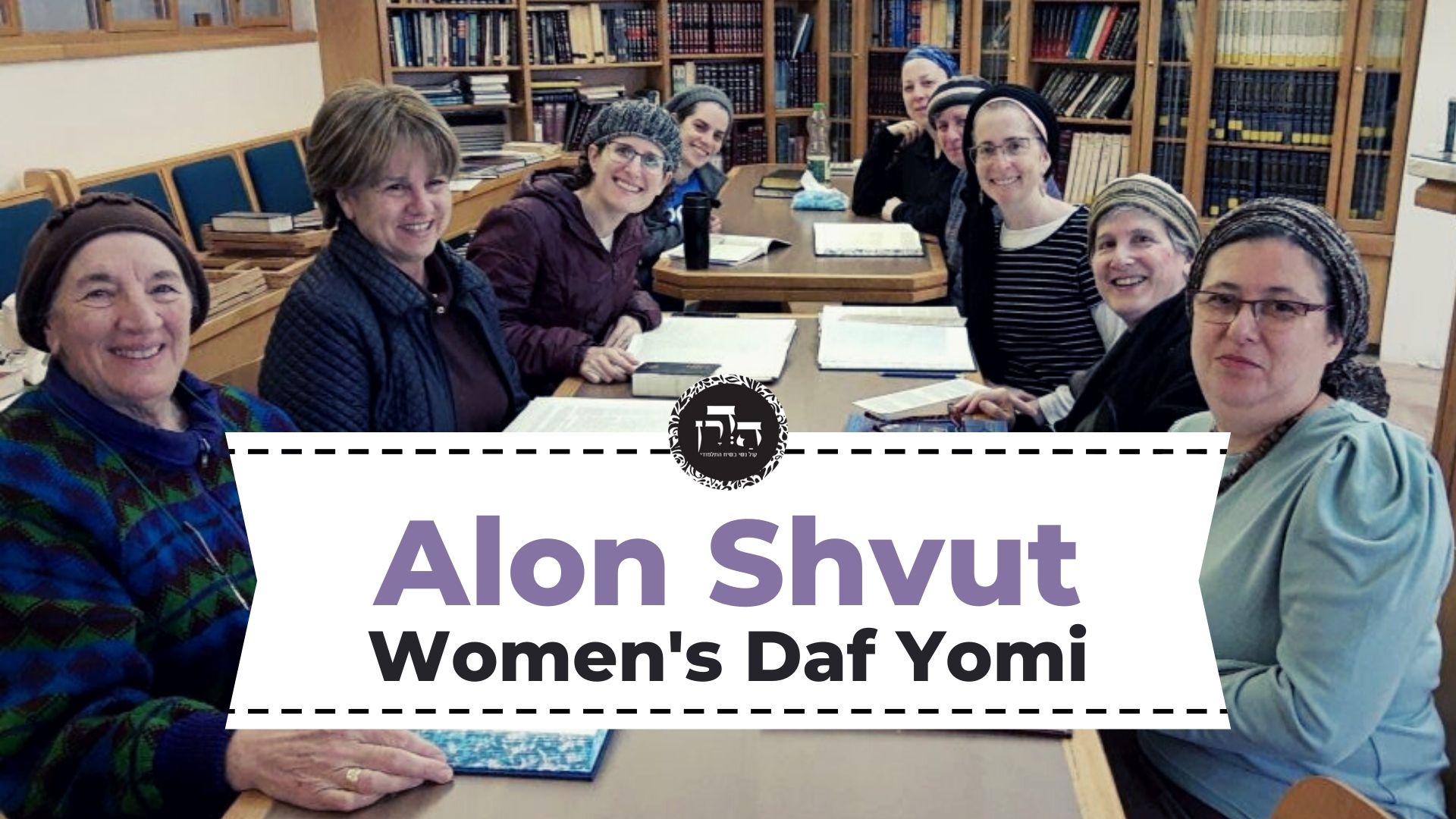Does repentance atone even for negative commandments or does one need to atone and also wait for Yom Kippur? What are the differences in the levels of atonement addressed by Rabbi Yishmael? What is considered a desecration of the name of God that only death atones for? What are the different virtues of repentance? Should one reveal his sins in public or keep silent about them? On what does it depend? How can one do true repentance? If one sinned and repeated one’s sin several times, at what point is one’s repentance no longer accepted? If one confessed one’s sins one year, is one obligated to confess again the following year? If the answer is no, is one allowed to if one wishes to do so? Should one specify exactly the sin one committed?
This month’s learning is dedicated to the refuah shleima of our dear friend, Phyllis Hecht, גיטל פעשא בת מאשה רחל by all her many friends who love and admire her. Phyllis’ emuna, strength, and positivity are an inspiration.
Want to dedicate learning? Get started here:


Today’s daily daf tools:
This month’s learning is dedicated to the refuah shleima of our dear friend, Phyllis Hecht, גיטל פעשא בת מאשה רחל by all her many friends who love and admire her. Phyllis’ emuna, strength, and positivity are an inspiration.
Today’s daily daf tools:
Delve Deeper
Broaden your understanding of the topics on this daf with classes and podcasts from top women Talmud scholars.
New to Talmud?
Check out our resources designed to help you navigate a page of Talmud – and study at the pace, level and style that fits you.
The Hadran Women’s Tapestry
Meet the diverse women learning Gemara at Hadran and hear their stories.
Yoma 86
חוּץ מִ״לֹּא תִשָּׂא״! ״לֹא תִשָּׂא״ וְכֹל דְּדָמֵי לֵיהּ.
except for: “You shall not take the name of the Lord, your God, in vain” (Exodus 20:7), about which the Torah states: “For God will not absolve him who takes His name in vain” (Exodus 20:7). The Gemara answers: It is not that this is the only negative mitzva that is not a minor transgression; rather, it is: “You shall not take the name of the Lord, your God, in vain” and any prohibition similar to it, meaning all severe prohibitions that carry punishment by a court.
תָּא שְׁמַע, רַבִּי יְהוּדָה אוֹמֵר: כֹּל שֶׁהוּא מִ״לֹּא תִשָּׂא״ וּלְמַטָּה — תְּשׁוּבָה מְכַפֶּרֶת, מִ״לֹּא תִשָּׂא״ וּלְמַעְלָה — תְּשׁוּבָה תּוֹלָה וְיוֹם הַכִּפּוּרִים מְכַפֵּר. ״לֹא תִשָּׂא״ וְכׇל דְּדָמֵי לֵיהּ.
The Gemara proposes: Come and hear from that which was taught: Rabbi Yehuda says: For any sin from “You shall not take the name of the Lord, your God, in vain” and below, i.e., prohibitions less severe than that, repentance atones. For any sin from “You shall not take the name of the Lord, your God, in vain” and above, repentance suspends punishment and Yom Kippur atones. The Gemara rejects this: This does not constitute proof either, since one could say that it is referring to: “You shall not take the name of the Lord, your God, in vain” and anything similar to it.
תָּא שְׁמַע: לְפִי שֶׁנֶּאֱמַר בְּחוֹרֵב תְּשׁוּבָה ״וְנַקֵּה״, יָכוֹל אַף ״לֹא תִשָּׂא״ עִמָּהֶן — תַּלְמוּד לוֹמַר: ״לֹא יְנַקֶּה״. יָכוֹל אַף שְׁאָר חַיָּיבֵי לָאוִין כֵּן — תַּלְמוּד לוֹמַר: ״אֶת שְׁמוֹ״, שְׁמוֹ הוּא דְּאֵינוֹ מְנַקֶּה, אֲבָל מְנַקֶּה שְׁאָר חַיָּיבֵי לָאוִין.
Come and hear from a different source that was taught: Since it was stated at Horeb with regard to repentance: “Absolve,” one might have thought that even the transgression of: “You shall not take the name of the Lord, your God, in vain” is included among them; therefore, the verses states: “Will not absolve” (Exodus 20:6). One might have thought this is also true for those who are liable for violating all other prohibitions; therefore, the verse states: “His name.” God does not absolve the one who disrespects His name, but He absolves those who are liable for violating all other prohibitions and repent. This is proof that those who violate all other prohibitions are not comparable to one who violates: “You shall not take the name of the Lord, your God, in vain.”
תַּנָּאֵי הִיא, דְּתַנְיָא: עַל מָה תְּשׁוּבָה מְכַפֶּרֶת — עַל עֲשֵׂה וְעַל לֹא תַעֲשֶׂה שֶׁנִּיתַּק לַעֲשֵׂה, וְעַל מָה תְּשׁוּבָה תּוֹלָה וְיוֹם הַכִּפּוּרִים מְכַפֵּר — עַל כָּרֵיתוֹת וְעַל מִיתוֹת בֵּית דִּין, וְעַל לֹא תַעֲשֶׂה גָּמוּר.
The Gemara answers: This is a dispute between tanna’im, as it was taught in a baraita: For what does repentance atone? It atones for a positive mitzva and for a negative mitzva that can be rectified through a positive mitzva. And for what does repentance suspend punishment and Yom Kippur atone? It is for sins punishable by karet, and for sins punishable by the death penalty from the earthly court, and for full-fledged negative mitzvot. This indicates that there is a tanna who distinguishes between prohibitions that warrant lashes and those that do not. Therefore, there is a tannaitic dispute as to whether or not prohibitions that warrant punishment by the courts can be rectified by repentance alone.
אָמַר מָר: לְפִי שֶׁנֶּאֱמַר בְּחוֹרֵב ״וְנַקֵּה״. מְנָא לַן? דְּתַנְיָא, רַבִּי אֶלְעָזָר אוֹמֵר: אִי אֶפְשָׁר לוֹמַר ״נַקֵּה״, שֶׁכְּבָר נֶאֱמַר ״לֹא יְנַקֶּה״, וְאִי אֶפְשָׁר לוֹמַר ״לֹא יְנַקֶּה״, שֶׁכְּבָר נֶאֱמַר ״נַקֵּה״. הָא כֵּיצַד? מְנַקֶּה הוּא לְשָׁבִין, וְאֵינוֹ מְנַקֶּה לְשֶׁאֵינָן שָׁבִין.
§ Since the Gemara cited this baraita, it now clarifies part of it. The Master said: Since it was stated at Horeb with regard to repentance: “Absolve.” The Gemara asks: From where do we derive this concept that repentance was mentioned there? The Gemara answers: As it was taught in a baraita that Rabbi Elazar says: It is not possible to say “absolve” (Exodus 34:7) about all transgressions, since “will not absolve” is already stated (Exodus 34:7). And it is not possible to say “will not absolve,” since “absolve” is already stated. How so? The Holy One, Blessed be He, absolves those who repent and does not absolve those who do not repent. Therefore, both “repentance” and “absolve” were mentioned at Horeb.
שָׁאַל רַבִּי מַתְיָא בֶּן חָרָשׁ אֶת רַבִּי אֶלְעָזָר בֶּן עֲזַרְיָה בְּרוֹמִי: שָׁמַעְתָּ אַרְבָּעָה חִלּוּקֵי כַפָּרָה שֶׁהָיָה רַבִּי יִשְׁמָעֵאל דּוֹרֵשׁ? אָמַר: שְׁלֹשָׁה הֵן, וּתְשׁוּבָה עִם כׇּל אֶחָד וְאֶחָד.
Furthermore, with regard to the topic of repentance, Rabbi Matya ben Ḥarash asked Rabbi Elazar ben Azarya when Rabbi Elazar was in Rome: Have you heard the teaching that there are four distinctions in the process of atonement that Rabbi Yishmael would derive? He said to him: They are not four but three distinctions, and repentance is necessary with each one.
עָבַר עַל עֲשֵׂה וְשָׁב — אֵינוֹ זָז מִשָּׁם עַד שֶׁמּוֹחֲלִין לוֹ, שֶׁנֶּאֱמַר: ״שׁוּבוּ בָּנִים שׁוֹבָבִים״. עָבַר עַל לֹא תַעֲשֶׂה וְעָשָׂה תְּשׁוּבָה — תְּשׁוּבָה תּוֹלָה, וְיוֹם הַכִּפּוּרִים מְכַפֵּר. שֶׁנֶּאֱמַר: ״כִּי בַיּוֹם הַזֶּה יְכַפֵּר עֲלֵיכֶם מִכֹּל חַטֹּאתֵיכֶם״. עָבַר עַל כָּרֵיתוֹת וּמִיתוֹת בֵּית דִּין וְעָשָׂה תְּשׁוּבָה — תְּשׁוּבָה וְיוֹם הַכִּפּוּרִים תּוֹלִין, וְיִסּוּרִין מְמָרְקִין. שֶׁנֶּאֱמַר: ״וּפָקַדְתִּי בְשֵׁבֶט פִּשְׁעָם וּבִנְגָעִים עֲוֹנָם״.
These are the categories: If one violates a positive mitzva and repents, he is forgiven even before he moves from his place, i.e. immediately, as it is stated: “Return, you backsliding children, I will heal your backsliding” (Jeremiah 3:22), implying that when one repents he is immediately forgiven. If one violates a prohibition and repents, repentance suspends his punishment and Yom Kippur atones for his sin, as it is stated: “For on this day shall atonement be made for you, to purify you from all your sins” (Leviticus 16:30). If one commits a transgression that warrants karet or a sin punishable by death from the earthly court and then repents, repentance and Yom Kippur suspend his punishment, and suffering absolves and completes the atonement, as it is stated: “Then will I visit their transgression with the rod, and their iniquity with strokes” (Psalms 89:33).
אֲבָל מִי שֶׁיֵּשׁ חִילּוּל הַשֵּׁם בְּיָדוֹ — אֵין לוֹ כֹּחַ בִּתְשׁוּבָה לִתְלוֹת וְלֹא בְּיוֹם הַכִּפּוּרִים לְכַפֵּר וְלֹא בְּיִסּוּרִין לְמָרֵק, אֶלָּא כּוּלָּן תּוֹלִין, וּמִיתָה מְמָרֶקֶת, שֶׁנֶּאֱמַר: ״וְנִגְלָה בְאׇזְנָי ה׳ צְבָאוֹת אִם יְכוּפַּר הֶעָוֹן הַזֶּה לָכֶם עַד תְּמוּתוּן״.
But in the case of one who has caused desecration of God’s name, his repentance has no power to suspend punishment, nor does Yom Kippur have power to atone for his sin, nor does suffering alone have power to absolve him. Rather, all these suspend punishment, and death absolves him, as it is stated: “And the Lord of Hosts revealed Himself to my ears: This iniquity shall not be atoned for until you die” (Isaiah 22:14).
הֵיכִי דָּמֵי חִילּוּל הַשֵּׁם? אָמַר רַב: כְּגוֹן אֲנָא, אִי שָׁקֵילְנָא בִּישְׂרָא מִטַּבָּחָא וְלָא יָהֵיבְנָא דְּמֵי לְאַלְתַּר. אָמַר אַבָּיֵי: לֹא שָׁנוּ אֶלָּא בְּאַתְרָא דְּלָא תָּבְעִי, אֲבָל בְּאַתְרָא דְּתָבְעִי — לֵית לַן בַּהּ.
§ The Gemara asks: What are the circumstances that cause desecration of God’s name? Rav said: For example, in the case of someone like me, since I am an important public figure, if I take meat from a butcher and do not give him money immediately, people are likely to think that I did not mean to pay at all. They would consider me a thief and learn from my behavior that one is permitted to steal. Abaye said: They taught this statement of Rav only in a place where they do not ask for the money, where it is not customary for the butcher himself to come and collect payment from the customer. When the customer does not pay immediately, people may suspect him of theft. But in a place where they ask for the money from the customer some time later, we have no problem with doing this. Since everyone understands he is buying on credit, he is not desecrating God’s name.
אָמַר רָבִינָא: וּמָתָא מַחְסֵיָא אַתְרָא דְּתָבְעִי הוּא. אַבָּיֵי כִּדְשָׁקֵיל בִּישְׂרָא מִתְּרֵי שׁוּתָּפֵי, יָהֵיב זוּזָא לְהַאי וְזוּזָא לְהַאי, וַהֲדַר מְקָרֵב לְהוּ גַּבֵּי הֲדָדֵי וְעָבֵיד חוּשְׁבָּנָא.
Ravina said: My native city of Meḥasya is a place where they ask for and collect the money. The Gemara relates that when Abaye bought meat from two partners, he would give the money to this one and the money to this one, so that each would know that he had paid. And afterward he would bring them together and perform the calculation to see whether he received his change.
רַבִּי יוֹחָנָן אָמַר: כְּגוֹן אֲנָא דִּמְסַגֵּינָא אַרְבַּע אַמּוֹת בְּלָא תּוֹרָה וּבְלָא תְּפִילִּין. יִצְחָק דְּבֵי רַבִּי יַנַּאי אָמַר: כׇּל שֶׁחֲבֵירָיו מִתְבַּיְּישִׁין מֵחֲמַת שְׁמוּעָתוֹ (הַיְינוּ חִילּוּל הַשֵּׁם). אָמַר רַב נַחְמָן בַּר יִצְחָק: כְּגוֹן דְּקָא אָמְרִי אִינָשֵׁי: שְׁרָא לֵיהּ מָרֵיהּ לִפְלָנְיָא.
Rabbi Yoḥanan said: What is an example of desecration of God’s name? For example, someone like me, if I would walk four cubits without Torah and without phylacteries, and the onlookers did not know that it is only on account of my body’s weakness, that would be a desecration of God’s name. Yitzḥak from the school of Rabbi Yannai said: Any case when one’s friends are embarrassed on account of his reputation, meaning his friends are embarrassed due to things they hear about him, this is a desecration of God’s name. Rav Naḥman bar Yitzḥak said: One creates a profanation of God’s name, for example, when people say about him: May his Master forgive so-and-so for the sins he has done.
אַבָּיֵי אָמַר, כִּדְתַנְיָא: ״וְאָהַבְתָּ אֵת ה׳ אֱלֹהֶיךָ״, שֶׁיְּהֵא שֵׁם שָׁמַיִם מִתְאַהֵב עַל יָדְךָ. שֶׁיְּהֵא קוֹרֵא וְשׁוֹנֶה וּמְשַׁמֵּשׁ תַּלְמִידֵי חֲכָמִים, וִיהֵא מַשָּׂאוֹ וּמַתָּנוֹ בְּנַחַת עִם הַבְּרִיּוֹת, מָה הַבְּרִיּוֹת אוֹמְרוֹת עָלָיו — אַשְׁרֵי אָבִיו שֶׁלִּמְּדוֹ תּוֹרָה, אַשְׁרֵי רַבּוֹ שֶׁלִּמְּדוֹ תּוֹרָה. אוֹי לָהֶם לַבְּרִיּוֹת שֶׁלֹּא לָמְדוּ תּוֹרָה, פְּלוֹנִי שֶׁלִּמְּדוֹ תּוֹרָה — רְאוּ כַּמָּה נָאִים דְּרָכָיו, כַּמָּה מְתוּקָּנִים מַעֲשָׂיו. עָלָיו הַכָּתוּב אוֹמֵר: ״וַיֹּאמֶר לִי עַבְדִּי אָתָּה יִשְׂרָאֵל אֲשֶׁר בְּךָ אֶתְפָּאָר״.
Abaye said: As it was taught in a baraita that it is stated: “And you shall love the Lord your God” (Deuteronomy 6:5), which means that you shall make the name of Heaven beloved. How should one do so? One should do so in that he should read Torah, and learn Mishna, and serve Torah scholars, and he should be pleasant with people in his business transactions. What do people say about such a person? Fortunate is his father who taught him Torah, fortunate is his teacher who taught him Torah, woe to the people who have not studied Torah. So-and-so, who taught him Torah, see how pleasant are his ways, how proper are his deeds. The verse states about him and others like him: “You are My servant, Israel, in whom I will be glorified” (Isaiah 49:3).
אֲבָל מִי שֶׁקּוֹרֵא וְשׁוֹנֶה וּמְשַׁמֵּשׁ תַּלְמִידֵי חֲכָמִים, וְאֵין מַשָּׂאוֹ וּמַתָּנוֹ בֶּאֱמוּנָה, וְאֵין דִּבּוּרוֹ בְּנַחַת עִם הַבְּרִיּוֹת, מָה הַבְּרִיּוֹת אוֹמְרוֹת עָלָיו — אוֹי לוֹ לִפְלוֹנִי שֶׁלָּמַד תּוֹרָה. אוֹי לוֹ לְאָבִיו שֶׁלִּמְּדוֹ תּוֹרָה, אוֹי לוֹ לְרַבּוֹ שֶׁלִּמְּדוֹ תּוֹרָה. פְּלוֹנִי שֶׁלָּמַד תּוֹרָה — רְאוּ כַּמָּה מְקוּלְקָלִין מַעֲשָׂיו וְכַמָּה מְכוֹעָרִין דְּרָכָיו, וְעָלָיו הַכָּתוּב אוֹמֵר: ״בֶּאֱמוֹר לָהֶם עַם ה׳ אֵלֶּה וּמֵאַרְצוֹ יָצָאוּ״.
But one who reads Torah, and learns Mishna, and serves Torah scholars, but his business practices are not done faithfully, and he does not speak pleasantly with other people, what do people say about him? Woe to so-and-so who studied Torah, woe to his father who taught him Torah, woe to his teacher who taught him Torah. So-and-so who studied Torah, see how destructive are his deeds, and how ugly are his ways. About him and others like him the verse states that the gentiles will say: “Men said of them: These are the people of the Lord, yet they had to leave His land” (Ezekiel 36:20). Through their sins and subsequent exile, such people have desecrated the name of God.
אָמַר רַבִּי חָמָא (בַּר) חֲנִינָא: גְּדוֹלָה תְּשׁוּבָה שֶׁמְּבִיאָה רִפְאוּת לְעוֹלָם, שֶׁנֶּאֱמַר: ״אֶרְפָּא מְשׁוּבָתָם אוֹהֲבֵם נְדָבָה״.
§ Further on the topic of repentance, Rabbi Ḥama bar Ḥanina said: Great is repentance, as it brings healing to the world, as it is stated: “I will heal their backsliding, I will love them freely” (Hosea 14:5), which teaches that repentance from sin brings healing.
רַבִּי חָמָא (בַּר) חֲנִינָא רָמֵי, כְּתִיב: ״שׁוּבוּ בָּנִים שׁוֹבָבִים״, דְּמֵעִיקָּרָא שׁוֹבָבִים אַתֶּם, וּכְתִיב: ״אֶרְפָּא מְשׁוּבוֹתֵיכֶם״! לָא קַשְׁיָא: כָּאן מֵאַהֲבָה, כָּאן מִיִּרְאָה.
Rabbi Ḥama bar Ḥanina raised a contradiction between two verses. It is written in one verse: “Return, you backsliding children” (Jeremiah 3:14), implying that initially when you sinned, it was only because you were backsliding, i.e., rebelling. It was merely an act of immaturity and foolishness and could be ignored as if it had never happened. But it is written: “I will heal your backsliding” (Jeremiah 3:22), implying that He will heal the sin from this point onward, and that they are still sinners. He resolved this contradiction, explaining that this is not difficult: Here, where everything is forgiven as if the Jewish people never sinned, it is referring to repentance out of love; there, where the sin is still remembered despite the forgiveness and repentance, it is referring to repentance out of fear.
רַב יְהוּדָה רָמֵי, כְּתִיב: ״שׁוּבוּ בָּנִים שׁוֹבָבִים אֶרְפָּא מְשׁוּבוֹתֵיכֶם״, וּכְתִיב: ״(הִנֵּה) אָנֹכִי בָּעַלְתִּי בָכֶם וְלָקַחְתִּי אֶתְכֶם אֶחָד מֵעִיר וּשְׁנַיִם מִמִּשְׁפָּחָה״! לָא קַשְׁיָא: כָּאן מֵאַהֲבָה אוֹ מִיִּרְאָה, כָּאן עַל יְדֵי יִסּוּרִין. אָמַר רַבִּי לֵוִי: גְּדוֹלָה תְּשׁוּבָה שֶׁמַּגַּעַת עַד כִּסֵּא הַכָּבוֹד, שֶׁנֶּאֱמַר: ״שׁוּבָה יִשְׂרָאֵל עַד ה׳ אֱלֹהֶיךָ״.
Similarly, Rabbi Yehuda raised a contradiction between two verses. It is written: “Return, you backsliding children I will heal your backsliding” (Jeremiah 3:22), implying that anyone can achieve healing, which is dependent only on repentance. But it also states: “Return, O backsliding children, says the Lord, for I am a lord to you, and I will take you one from a city, and two from a family” (Jeremiah 3:14), implying that repentance is available only to certain individuals. He resolved the contradiction and explained that this is not difficult: Here, it is referring to repentance out of love or fear, which few people achieve; there, it referring is repentance through suffering, as everyone has thoughts of repentance when they suffer. Rabbi Levi said: Great is repentance, as it reaches the heavenly throne, as it is stated: “Return, Israel, to the Lord your God” (Hosea 14:2). This implies that repentance literally reaches to God.
אָמַר רַבִּי יוֹחָנָן: גְּדוֹלָה תְּשׁוּבָה שֶׁדּוֹחָה אֶת לֹא תַעֲשֶׂה שֶׁבַּתּוֹרָה, שֶׁנֶּאֱמַר: ״לֵאמֹר הֵן יְשַׁלַּח אִישׁ אֶת אִשְׁתּוֹ וְהָלְכָה מֵאִתּוֹ וְהָיְתָה לְאִישׁ אַחֵר הֲיָשׁוּב אֵלֶיהָ עוֹד הֲלֹא חָנוֹף תֶּחֱנַף הָאָרֶץ הַהִיא וְאַתְּ זָנִית רֵעִים רַבִּים וְשׁוֹב אֵלַי נְאֻם ה׳״.
§ Rabbi Yoḥanan said: Great is repentance, as it overrides even a prohibition of the Torah. How so? As it is stated that God said: “…Saying: If a man sends away his wife and she goes from him and becomes another man’s, may he return to her again? Will not that land be greatly polluted? But you have committed adultery with many lovers; and would you yet return to Me, said the Lord” (Jeremiah 3:1). Indeed, the Torah states: “Her former husband, who sent her away, may not take her again to be his wife after she has been made impure” (Deuteronomy 24:4). The relationship between the Jewish people and the Holy One, Blessed be He, is compared to that between a husband and wife. Just as it is prohibited for an adulterous wife to return to her husband, it should be prohibited for the Jewish people to return to God from their sins, yet repentance overrides this prohibition.
אָמַר רַבִּי יוֹנָתָן: גְּדוֹלָה תְּשׁוּבָה (שֶׁמְּקָרֶבֶת) אֶת הַגְּאוּלָּה, שֶׁנֶּאֱמַר: ״וּבָא לְצִיּוֹן גּוֹאֵל וּלְשָׁבֵי פֶשַׁע בְּיַעֲקֹב״, מָה טַעַם ״וּבָא לְצִיּוֹן גּוֹאֵל״ — מִשּׁוּם דְּ״שָׁבֵי פֶשַׁע בְּיַעֲקֹב״.
Rabbi Yonatan said: Great is repentance, which hastens the redemption, as it is stated: “And a redeemer will come to Zion, and to those who repent from transgression in Jacob” (Isaiah 59:20). What is the reason that a redeemer will come to Zion? It is because there are those who repent from transgression in Jacob.
אָמַר רֵישׁ לָקִישׁ: גְּדוֹלָה תְּשׁוּבָה שֶׁזְּדוֹנוֹת נַעֲשׂוֹת לוֹ כִּשְׁגָגוֹת, שֶׁנֶּאֱמַר: ״שׁוּבָה יִשְׂרָאֵל עַד ה׳ אֱלֹהֶיךָ כִּי כָשַׁלְתָּ בַּעֲוֹנֶךָ״, הָא ״עָוֹן״ — מֵזִיד הוּא, וְקָא קָרֵי לֵיהּ מִכְשׁוֹל. אִינִי?! וְהָאָמַר רֵישׁ לָקִישׁ: גְּדוֹלָה תְּשׁוּבָה שֶׁזְּדוֹנוֹת נַעֲשׂוֹת לוֹ כִּזְכִיּוֹת, שֶׁנֶּאֱמַר: ״וּבְשׁוּב רָשָׁע מֵרִשְׁעָתוֹ וְעָשָׂה מִשְׁפָּט וּצְדָקָה עֲלֵיהֶם (חָיֹה) יִחְיֶה״! לָא קַשְׁיָא: כָּאן מֵאַהֲבָה, כָּאן מִיִּרְאָה.
Reish Lakish said: Great is repentance, as the penitent’s intentional sins are counted for him as unwitting transgressions, as it is stated: “Return, Israel, to the Lord your God, for you have stumbled in your iniquity” (Hosea 14:2). The Gemara analyzes this: Doesn’t “iniquity” mean an intentional sin? Yet the prophet calls it stumbling, implying that one who repents is considered as though he only stumbled accidentally in his transgression. The Gemara asks: Is that so? Didn’t Reish Lakish himself say: Great is repentance, as one’s intentional sins are counted for him as merits, as it is stated: “And when the wicked turns from his wickedness, and does that which is lawful and right, he shall live thereby” (Ezekiel 33:19), and all his deeds, even his transgressions, will become praiseworthy? The Gemara reconciles: This is not difficult: Here, when one repents out of love, his sins become like merits; there, when one repents out of fear, his sins are counted as unwitting transgressions.
אָמַר רַבִּי שְׁמוּאֵל בַּר נַחְמָנִי אָמַר רַבִּי יוֹנָתָן: גְּדוֹלָה תְּשׁוּבָה שֶׁמַּאֲרֶכֶת שְׁנוֹתָיו שֶׁל אָדָם, שֶׁנֶּאֱמַר: ״וּבְשׁוּב רָשָׁע מֵרִשְׁעָתוֹ (חָיוֹ) יִחְיֶה״.
Rabbi Shmuel bar Naḥmani said that Rabbi Yonatan said: Great is repentance, which lengthens the years of a person’s life, as it is stated: “When the wicked man turns from his wickedness that he has committed, and does that which is lawful and right, he will preserve his life” (Ezekiel 18:27).
אָמַר רַבִּי יִצְחָק: אָמְרִי בְּמַעְרְבָא מִשְּׁמֵיהּ דְּרַבָּה בַּר מָרִי: בֹּא וּרְאֵה שֶׁלֹּא כְּמִדַּת הַקָּדוֹשׁ בָּרוּךְ הוּא מִדַּת בָּשָׂר וָדָם: מִדַּת בָּשָׂר וָדָם, מַקְנִיט אֶת חֲבֵירוֹ בִּדְבָרִים — סָפֵק מִתְפַּיֵּיס הֵימֶנּוּ, סָפֵק אֵין מִתְפַּיֵּיס הֵימֶנּוּ. וְאִם תֹּאמַר מִתְפַּיֵּיס הֵימֶנּוּ — סָפֵק מִתְפַּיֵּיס בִּדְבָרִים, סָפֵק אֵין מִתְפַּיֵּיס בִּדְבָרִים,
§ Rabbi Yitzḥak said: They say in the West, Eretz Yisrael, in the name of Rabba bar Mari: Come and see that the attribute of flesh and blood is unlike the attribute of the Holy One, Blessed be He. With flesh and blood people, if one insults his friend with words, it is uncertain whether the victim will be appeased by him or will not be appeased by him. And if you say he will be appeased, it is still uncertain whether he will be appeased by words alone or will not be appeased by words alone, and one must try to appease him in other ways.
אֲבָל הַקָּדוֹשׁ בָּרוּךְ הוּא, אָדָם עוֹבֵר עֲבֵירָה בַּסֵּתֶר — מִתְפַּיֵּיס מִמֶּנּוּ בִּדְבָרִים, שֶׁנֶּאֱמַר: ״קְחוּ עִמָּכֶם דְּבָרִים וְשׁוּבוּ אֶל ה׳״. וְלֹא עוֹד, אֶלָּא שֶׁמַּחְזִיק לוֹ טוֹבָה, שֶׁנֶּאֱמַר: ״וְקַח טוֹב״. וְלֹא עוֹד אֶלָּא שֶׁמַּעֲלֶה עָלָיו הַכָּתוּב כְּאִילּוּ הִקְרִיב פָּרִים, שֶׁנֶּאֱמַר: ״וּנְשַׁלְּמָה פָּרִים שְׂפָתֵינוּ״. שֶׁמָּא תֹּאמַר פָּרֵי חוֹבָה, תַּלְמוּד לוֹמַר: ״אֶרְפָּא מְשׁוּבָתָם אוֹהֲבֵם נְדָבָה״.
But with regard to the Holy One, Blessed be He, if a person commits a transgression in private, God is appeased by words, as it is stated: “Take with you words and return to God” (Hosea 14:3). And not only that, but God considers it as though he has done a favor for God by repenting, as it is stated: “Accept that which is good” (Hosea 14:3). And not only that, but the verse ascribes him credit as though he had sacrificed bulls, as it is stated: “So we will render for bulls the offering of our lips” (Hosea 14:3). Lest you say he is considered only like one who offers obligatory bulls, therefore the verse states: “I will heal their backsliding, I will love them freely” (Hosea 14:5). Repentance is considered as though it were the sacrifice of a free-will offering.
תַּנְיָא, הָיָה רַבִּי מֵאִיר אוֹמֵר: גְּדוֹלָה תְּשׁוּבָה, שֶׁבִּשְׁבִיל יָחִיד שֶׁעָשָׂה תְּשׁוּבָה — מוֹחֲלִין לְכׇל הָעוֹלָם כּוּלּוֹ, שֶׁנֶּאֱמַר: ״אֶרְפָּא מְשׁוּבָתָם אוֹהֲבֵם נְדָבָה כִּי שָׁב אַפִּי מִמֶּנּוּ״. ״מֵהֶם״ לֹא נֶאֱמַר, אֶלָּא ״מִמֶּנּוּ״.
It was taught in a baraita that Rabbi Meir would say: Great is repentance because the entire world is forgiven on account of one individual who repents, as it is stated: “I will heal their backsliding, I will love them freely; for My anger has turned away from him” (Hosea 14:5). It does not say: From them, i.e., from the sinners, but “from him,” i.e., from that individual. Because he repented, everyone will be healed.
הֵיכִי דָּמֵי בַּעַל תְּשׁוּבָה? אָמַר רַב יְהוּדָה: כְּגוֹן שֶׁבָּאת לְיָדוֹ דְּבַר עֲבֵירָה פַּעַם רִאשׁוֹנָה וּשְׁנִיָּה וְנִיצַּל הֵימֶנָּה. מַחְוֵי רַב יְהוּדָה: בְּאוֹתָהּ אִשָּׁה, בְּאוֹתוֹ פֶּרֶק, בְּאוֹתוֹ מָקוֹם.
§ With regard to repentance, the Gemara asks: What are the circumstances that demonstrate that one has completely repented? Rav Yehuda said: For example, the prohibited matter came to his hand a first time and a second time, and he was saved from it, thereby proving that he has completely repented. Rav Yehuda demonstrated what he meant: If one has the opportunity to sin with the same woman he sinned with previously, at the same time and the same place, and everything is aligned as it was that first time when he sinned, but this time he overcomes his inclination, it proves his repentance is complete, and he is forgiven.
אָמַר רַב יְהוּדָה, רַב רָמֵי — כְּתִיב: ״אַשְׁרֵי נְשׂוּי פֶּשַׁע כְּסוּי חֲטָאָה״, וּכְתִיב: ״מְכַסֶּה פְשָׁעָיו לֹא יַצְלִיחַ״! לָא קַשְׁיָא: הָא בְּחֵטְא מְפוּרְסָם, הָא בְּחֵטְא שֶׁאֵינוֹ מְפוּרְסָם. רַב זוּטְרָא בַּר טוֹבִיָּה אָמַר רַב נַחְמָן: כָּאן בַּעֲבֵירוֹת שֶׁבֵּין אָדָם לַחֲבֵירוֹ, כָּאן בַּעֲבֵירוֹת שֶׁבֵּין אָדָם לַמָּקוֹם.
Rav Yehuda said that Rav raised a contradiction: It is written: “Fortunate is he whose transgression is forgiven, whose sin is hidden” (Psalms 32:1), implying that it is inappropriate for one to reveal his sins, and it is written: “He who hides his transgressions shall not prosper” (Proverbs 28:13). He resolved the contradiction as follows: This is not difficult. Here it is referring to a publicized sin; since his sin is public knowledge it is fitting for him to also publicize his repentance. There, it is referring to a sin that is not publicized, in which case it is inappropriate to publicize one’s repentance. Rav Zutra bar Toviya said that Rav Naḥman said: Here, it is referring to sins a person commits against another; he must publicize his repentance so that those who hear him may persuade the other to forgive him. There, it is referring to sins a person commits against God, in which case he need not repent publicly.
תַּנְיָא, רַבִּי יוֹסֵי בַּר יְהוּדָה אוֹמֵר: אָדָם עוֹבֵר עֲבֵירָה פַּעַם רִאשׁוֹנָה — מוֹחֲלִין לוֹ, שְׁנִיָּה — מוֹחֲלִין לוֹ, שְׁלִישִׁית — מוֹחֲלִין לוֹ, רְבִיעִית — אֵין מוֹחֲלִין לוֹ, שֶׁנֶּאֱמַר: ״כֹּה אָמַר ה׳ עַל שְׁלֹשָׁה פִּשְׁעֵי יִשְׂרָאֵל וְעַל אַרְבָּעָה לֹא אֲשִׁיבֶנּוּ״, (וְנֶאֱמַר:) ״הֵן כׇּל אֵלֶּה יִפְעַל אֵל פַּעֲמַיִם שָׁלֹשׁ עִם גָּבֶר״.
§ It was taught in a baraita that Rabbi Yosei bar Yehuda says: When a person commits a transgression the first time, he is forgiven; a second time, he is forgiven; a third time, he is forgiven; but the fourth time, he is not forgiven, as it is stated: “Thus said the Lord: For three transgressions of Israel, but for four I will not reverse it” (Amos 2:6). And it says: “All these things does God do twice or three times with a man” (Job 33:29).
מַאי ״וְאוֹמֵר״? וְכִי תֵּימָא: הָנֵי מִילֵּי בְּצִיבּוּר, אֲבָל בְּיָחִיד — לָא, תָּא שְׁמַע: ״הֶן כׇּל אֵלֶּה יִפְעַל אֵל פַּעֲמַיִם שָׁלֹשׁ עִם גָּבֶר״. (מִכָּאן וְאֵילָךְ אֵין מוֹחֲלִין לוֹ, שֶׁנֶּאֱמַר: ״עַל שְׁלֹשָׁה פִּשְׁעֵי יִשְׂרָאֵל וְעַל אַרְבָּעָה לֹא אֲשִׁיבֶנּוּ״.)
The Gemara asks: What is: And it says? Why did he need to bring an additional biblical proof when the first verse seems to suffice? The Gemara explains: Lest you say that this statement that the Holy One, Blessed be He, forgives easily the first three times applies to a community but not to an individual, come and hear proof from another verse that states: “All these things does God do twice or three times with a man,” implying that this is so even for an individual. From this point onward, he is not forgiven, as it is stated: “For three transgressions of Israel, but for four I will not reverse it.”
תָּנוּ רַבָּנַן: עֲבֵירוֹת שֶׁהִתְוַדָּה עֲלֵיהֶן יוֹם הַכִּפּוּרִים זֶה, לֹא יִתְוַדֶּה עֲלֵיהֶן יוֹם הַכִּפּוּרִים אַחֵר. וְאִם שָׁנָה בָּהֶן — צָרִיךְ לְהִתְוַדּוֹת יוֹם הַכִּפּוּרִים אַחֵר. וְאִם לֹא שָׁנָה בָּהֶן, וְחָזַר וְהִתְוַדָּה — עֲלֵיהֶן עָלָיו הַכָּתוּב אוֹמֵר: ״כְּכֶלֶב שָׁב עַל קִיאוֹ כְּסִיל שׁוֹנֶה בְּאִוַּלְתּוֹ״.
§ The Sages taught in the Tosefta: With regard to transgressions that one confessed on this Yom Kippur, he should not confess them on another Yom Kippur, since he has already been forgiven. But if he repeated those same transgressions during the year, he must confess them again on another Yom Kippur. And if he did not repeat them but did confess them again, about him the verse states: “As a dog that returns to its vomit, so is a fool who repeats his folly” (Proverbs 26:11), since it is inappropriate to go back and mention one’s earlier sins.
רַבִּי אֱלִיעֶזֶר בֶּן יַעֲקֹב אוֹמֵר: כׇּל שֶׁכֵּן שֶׁהוּא מְשׁוּבָּח, שֶׁנֶּאֱמַר: ״כִּי פְשָׁעַי אֲנִי אֵדָע וְחַטָּאתִי נֶגְדִּי תָמִיד״. אֶלָּא מָה אֲנִי מְקַיֵּים ״כְּכֶלֶב שָׁב עַל קִיאוֹ וְגוֹ׳״ — כִּדְרַב הוּנָא. דְּאָמַר רַב הוּנָא, כֵּיוָן שֶׁעָבַר אָדָם עֲבֵירָה וְשָׁנָה בָּהּ — הוּתְּרָה לוֹ. הוּתְּרָה לוֹ סָלְקָא דַּעְתָּךְ?! אֶלָּא אֵימָא: נַעֲשֵׂית לוֹ כְּהֶיתֵּר.
Rabbi Eliezer ben Ya’akov says: If one confesses in subsequent years, all the more so is he praiseworthy, as he remembers his earlier sins and is thereby humbled, as it is stated: “For I know my transgressions; and my sin is ever before me” (Psalms 51:5). But how do I establish the meaning of the verse: “Like a dog that returns to its vomit”? It may be established in accordance with the opinion of Rav Huna, as Rav Huna said: When a person commits a transgression and repeats it, it is permitted to him. The Gemara is surprised at this: Can it enter your mind that it is permitted to him because he has sinned twice? Rather, say it becomes to him as if it were permitted.
וְצָרִיךְ לִפְרוֹט אֶת הַחֵטְא, שֶׁנֶּאֱמַר: ״אָנָּא חָטָא הָעָם הַזֶּה חֲטָאָה גְדוֹלָה וַיַּעֲשׂוּ לָהֶם אֱלֹהֵי זָהָב״, דִּבְרֵי רַבִּי יְהוּדָה בֶּן בָּבָא. רַבִּי עֲקִיבָא אוֹמֵר: ״אַשְׁרֵי נְשׂוּי פֶּשַׁע כְּסוּי חֲטָאָה״. אֶלָּא מַהוּ שֶׁאָמַר מֹשֶׁה: ״וַיַּעֲשׂוּ לָהֶם אֱלֹהֵי זָהָב״? כִּדְרַבִּי יַנַּאי. דְּאָמַר רַבִּי יַנַּאי: אָמַר מֹשֶׁה לִפְנֵי הַקָּדוֹשׁ בָּרוּךְ הוּא: רִבּוֹנוֹ שֶׁל עוֹלָם! כֶּסֶף וְזָהָב שֶׁהִרְבֵּיתָ לָהֶם לְיִשְׂרָאֵל עַד שֶׁאָמְרוּ דַּי — גָּרַם לָהֶם שֶׁיַּעֲשׂוּ אֱלֹהֵי זָהָב.
Furthermore, during confession, one must detail the sin he committed and not suffice with a general admission of sin, as it is stated: “And Moses returned to the Lord and said: Please, this people have sinned a great sin, and have made themselves a god of gold” (Exodus 32:31); this is the statement of Rabbi Yehuda ben Bava. Rabbi Akiva says that the verse states: “Fortunate is he whose transgression is forgiven, whose sin is hidden” (Psalms 32:1), which teaches that one need not detail his sins. But what is the meaning of that which Moses said: “And have made themselves a god of gold” (Exodus 32:31)? It should be understood in accordance with the statement of Rabbi Yannai, as Rabbi Yannai said: Moses said before the Holy One, Blessed be He: Master of the universe, it is the silver and gold that you gave to the Jewish people in abundance, until they said: Enough, which caused them to make a god of gold. Consequently, the phrase: “And have made themselves a god of gold,” is not a description of the sin but an explanation and justification of it.
שְׁנֵי פַּרְנָסִים טוֹבִים עָמְדוּ לָהֶם לְיִשְׂרָאֵל: מֹשֶׁה וְדָוִד. מֹשֶׁה אָמַר: יִכָּתֵב סוּרְחָנִי, שֶׁנֶּאֱמַר: ״יַעַן לֹא הֶאֱמַנְתֶּם בִּי לְהַקְדִּישֵׁנִי״, דָּוִד אָמַר: אַל יִכָּתֵב סוּרְחָנִי. שֶׁנֶּאֱמַר: ״אַשְׁרֵי נְשׂוּי פֶּשַׁע כְּסוּי חֲטָאָה״.
It is said that two good leaders arose for the Jewish people: Moses and David. Moses said: Let my disgrace be written, i.e., may the sin I committed be written explicitly, as it is stated: “Because you did not believe in Me, to sanctify Me” (Numbers 20:12). In contrast, David said: Let my disgrace not be written, as it is stated: “Fortunate is he whose transgression is forgiven, whose sin is hidden” (Psalms 32:1).
מָשָׁל דְּמֹשֶׁה וְדָוִד לְמָה הַדָּבָר דּוֹמֶה? לִשְׁתֵּי נָשִׁים שֶׁלָּקוּ בְּבֵית דִּין, אַחַת קִלְקְלָה, וְאַחַת אָכְלָה פַּגֵּי שְׁבִיעִית. אָמְרָה לָהֶן אוֹתָהּ שֶׁאָכְלָה פַּגֵּי שְׁבִיעִית: בְּבַקָּשָׁה מִכֶּם, הוֹדִיעוּ עַל מָה הִיא לוֹקָה, שֶׁלֹּא יֹאמְרוּ: עַל מַה שֶּׁזּוֹ לוֹקָה — זוֹ לוֹקָה. הֵבִיאוּ פַּגֵּי שְׁבִיעִית וְתָלוּ בְּצַוָּארָהּ, וְהָיוּ מַכְרִיזִין לְפָנֶיהָ וְאוֹמְרִין: עַל עִסְקֵי שְׁבִיעִית הִיא לוֹקָה.
The Gemara explains: A parable with regard to Moses and David shows to what this may be compared. It may be compared to two women who were flogged in court for their sins. One of them sinned by engaging in forbidden relations, and one ate unripe figs of the Sabbatical Year although they are forbidden. The woman who ate the unripe figs of the Sabbatical Year said to the court: Please publicize the sin for which I am being flogged, so that people will not say that what that woman is being flogged for is also what this woman is being flogged for. They brought unripe figs of the Sabbatical Year, and hung them around her neck, and announced before her, saying: She is receiving lashes on account of the Sabbatical Year. Moses requested that his sin be publicized so that people would not think that he committed the same sins as the members of his generation, i.e., the Golden Calf and the report of the spies.
מְפַרְסְמִין אֶת הַחֲנֵפִין מִפְּנֵי חִילּוּל הַשֵּׁם, שֶׁנֶּאֱמַר: ״וּבְשׁוּב צַדִּיק מִצִּדְקוֹ וְעָשָׂה עָוֶל וְנָתַתִּי מִכְשׁוֹל לְפָנָיו״. תְּשׁוּבַת הַמּוּחְלָטִין מְעַכֶּבֶת הַפּוּרְעָנוּת, וְאַף עַל פִּי שֶׁנֶּחְתַּם עָלָיו גְּזַר דִּין שֶׁל פּוּרְעָנוּת.
Furthermore, they said: One exposes the hypocrites due to the desecration of God’s name, so others will not think that they are truly righteous and that their deeds bear imitating, as it is stated: “When a righteous man turns from his righteousness and commits iniquity, I will lay a stumbling block before him” (Ezekiel 3:20). That is, when people do not know that someone is wicked to the core, he causes other people to err and this desecrates the name of God when it is revealed. The repentance of utterly wicked people prevents suffering from coming upon them. And although the sentence of judgment has already been signed against them for suffering, their repentance prevents them from being punished.
שַׁלְוַת רְשָׁעִים סוֹפָהּ תַּקָּלָה, וְהָרְשׁוּת מְקַבֶּרֶת אֶת בְּעָלֶיהָ, עָרוֹם נִכְנָס לָהּ וְעָרוֹם יֵצֵא מִמֶּנָּה, וּלְוַאי שֶׁתְּהֵא יְצִיאָה כְּבִיאָה. רַב כִּי הֲוָה נָפֵיק לְמֵידַן דִּינָא אָמַר הָכִי: בִּצְבוּ נַפְשֵׁיהּ לִקְטָלָא נָפֵיק, וּצְבוּ בֵּיתֵיהּ לֵית הוּא עָבֵיד, וְרֵיקָן לְבֵיתֵיהּ אָזֵיל, וּלְוַאי שֶׁתְּהֵא בִּיאָה כִּיצִיאָה.
The tranquility of the wicked is ultimately their destruction, as in their contentment they sit and think about forbidden matters. And authority buries one who owns it. He was naked when he entered into power, and he will be naked when he leaves it, and if only his exit would be like his entrance, without sin and added iniquity. The Gemara relates: When Rav would leave his home to go to court to judge cases, he would say this of himself: Of his own will, he goes to die, because a judge who misjudges a case is liable to death at the hand of Heaven; and he does not fulfill the will of his household and he goes empty-handed to his household, because a judge does not receive a salary; and if only his entrance would be like his exit, without sin or transgression.
רָבָא כִּי הֲוָה נָפֵיק לְדִינָא אָמַר הָכִי:
When Rava would go to judge, he would say this of himself:


